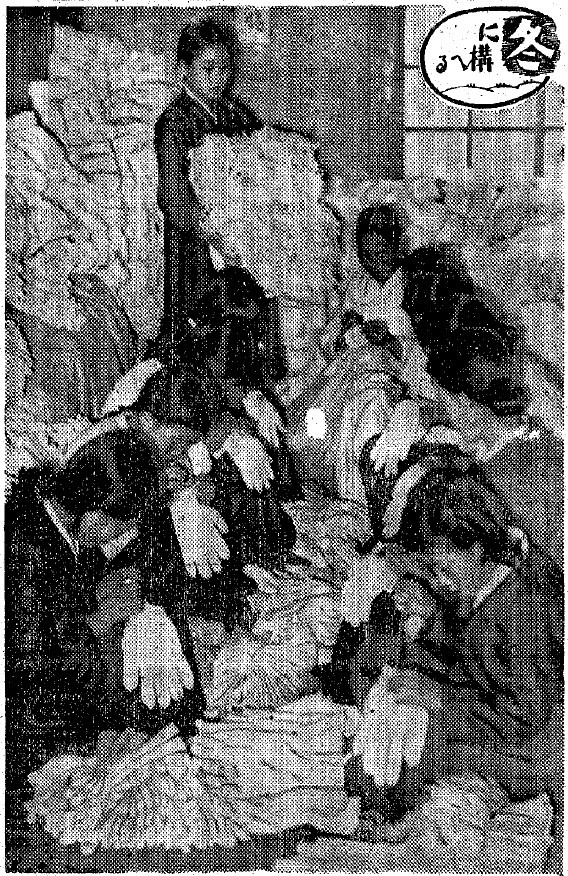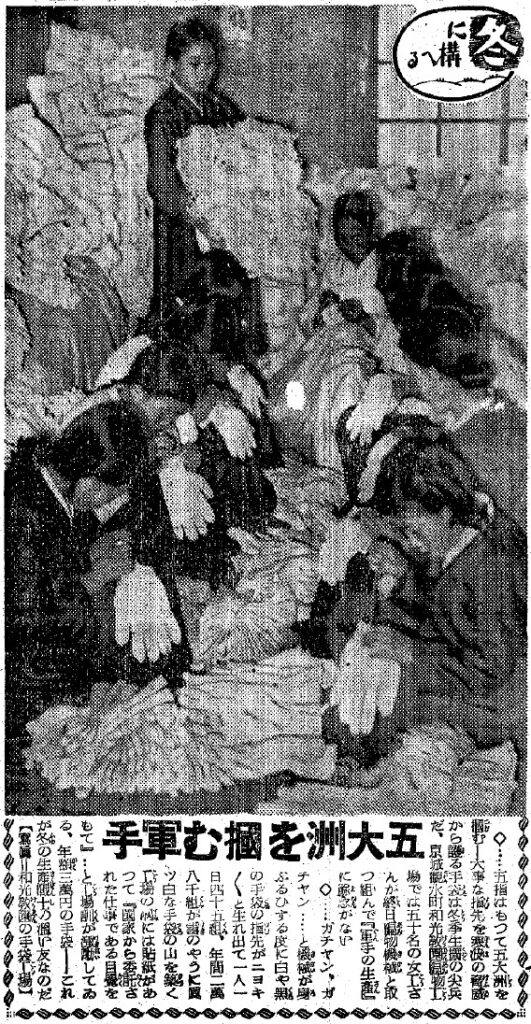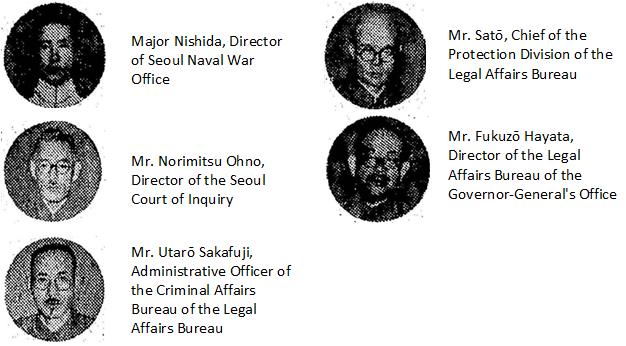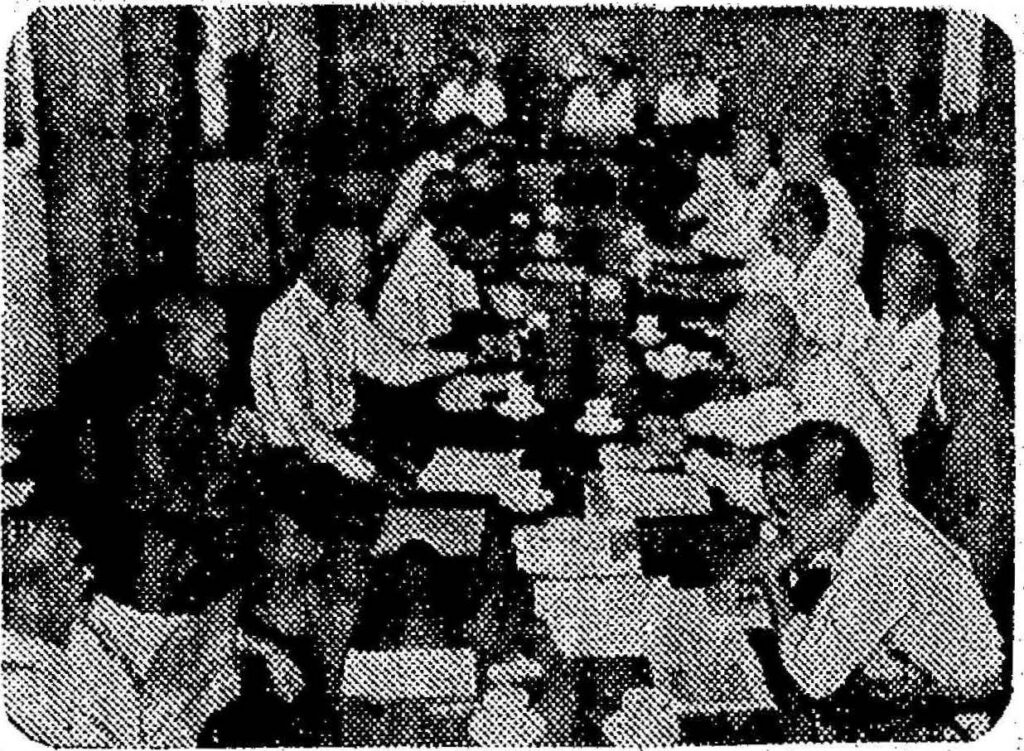The following three articles are from April 1944, when Imperial Japan was into its third year of fighting an all-out war against the United States in World War II. Food shortages were rampant, and the pressure was on to increase food production at any cost. Chemical fertilizers were scarce due to war production needs, so the Imperial Japanese colonial government of Korea mobilized the whole country to increase organic fertilizer production using human feces and urine. I selected these three articles to help piece together what was going on.
The first article describes a Volunteer Corps of young Korean men in one Seoul neighborhood hauling essentially human fecal sludge from bathrooms. The second article is a set of instructions on how to make organic fertilizer using organic debris and human feces and urine, digging pits, alternating layers of human feces and soil, and letting them sit to decompose. The third article is a very lengthy statement from the Governor-General’s Office, addressed to all of Korea, giving orders on how to increase organic fertilizer production. Note that organic fertilizers are called ‘self-supplied fertilizers’ throughout this article. Despite their best efforts, chemical fertilizers apparently could not be avoided for growing seeds.
Since this third article is such a tedious read, I’ve underlined some key passages to pay attention to. The government order expected everyone in Korea, including men, women, the elderly, little girls, to participate in this production. Labor was forcibly mobilized through the Patriotic Groups (JP: aikoku-han, KR: aeguk-ban, 愛國班) the neighborhood cells which were the local arm of the Korean Federation of National Power (国民総力朝鮮連盟, 국민총력조선연맹) , the single ruling party of colonial Korea. If previous patterns hold, then the government would ask the Patriotic Group leader (the Korean collaborator intermediary) for laborers (example: ‘Who can you spare?’), and the leader would ‘volunteer’ these laborers from among the residents he knows in his own Patriotic Group (example: ‘I think woman A and little girl B have some free time on their hands, and they can collect fallen leaves. I can volunteer them to you.’)
(Translation)
Gyeongseong Ilbo (Keijo Nippo) April 21, 1944
Garbage Trucks in the City in the Dawn Dusk
The cleaning service performed by the Palpan-dong Youth Volunteer Corps members
Practice is better than theory. The Seoul Palpan-dong Youth Volunteer Corps, which had set out to take the initiative before ordering others to do so, began a cleanup campaign on April 11 in an effort to initially start work in a familiar location.
This was to sweep the area of garbage and provide sanitation in the spring, and also to raise the health awareness of the residents at the same time. The corp members on duty gathered at 5 a.m. every morning at the Palpan-dong town council office. Under the command of Corps representative Hatani and under the orders of Captain Shigeyama, the Corps members silently worked breaking a sweat for two hours at a time to pump out the latrines and carry away the garbage before the townspeople even got up, and by 7:00 a.m. they were lined up in front of the town council office.
They sang the Oath of the Youth Volunteer Corps. They strive to improve their minds and bodies as they each go about their work. [Photo: The early morning cleanup of the Youth Volunteer Corps members]
Home Gardening: How to Make Fertilizer
The shortcut to increase crop production is to double the amount of fertilizer, rather than to double the amount of land. Fertilizer is very important as a foodstuff for the crops, so let’s treat our crops with homemade fertilizer. Fertilizers are the most important thing for growing vegetables, and they should be applied as a starter fertilizer at a rate of about 1 kan (3.75 kg) for every tsubo (3.3 square meters) of land.
Dig a hole at least two shaku (about 61 cm or 2 feet) in depth, and throw in some dust, hay, straw, fallen leaves, horse manure, and anything else that will decompose. When you reach a thickness of 5 or 6 sun (15.1 cm or 18.2 cm), step on the mixture to make it more compact, and then sprinkle human feces, urine, and latrine juice over it. Then cover the human feces, urine, and latrine juice with about 2 sun (6 cm) of soil. Repeat this process every three weeks, alternating the top-bottom order of the layers each time [debris on the bottom and human feces on top the first time, debris on top and human feces on the bottom the second time, etc.]. Cover the hole with a lid to prevent rainwater from entering. When the hole is full, leave the lid on for two to three months to complete the process.
It is essential to let it fully decompose, otherwise it can cause more harm than good. Before applying it to the field, expose it to direct sunlight for three or four days, and crush it well before use.
Human feces and urine also have rapid efficacy as an additional fertilizer to use after seeding. Place a bucket or tub in the soil, avoiding direct sunlight and rain. Stir the human feces and urine into the bucket or tub, let it stand for three or four weeks, and when it has sufficiently decomposed, apply a dilution of three to six times the original amount of the human feces and urine. When using this method, dig a shallow pit to one side of the crop, apply the fertilizer, and always cover it with soil.
Gyeongseong Ilbo (Keijo Nippo) April 26, 1944
Measures to secure fertilizers and animal feed; Details regarding the Agricultural Promotion Association’s stated policy (part 2)
Start by converting waste materials into animal feed
Unfolding a campaign to increase self-supplied fertilizer production
III. Measures to secure self-supplied fertilizer production
In order to complete the agricultural production responsibility system imposed on Korean farming villages, it is necessary to increase the amount of fertilizers. However, since the situation is such that it is not possible to depend solely on chemical fertilizers, we must of course make every effort to increase the amount of self-supplied fertilizers.
However, since the increase of self-supplied fertilizers requires a great deal of effort, we shall put the following into practice on the premise that the increase of self-supplied fertilizers requires the determination of the government based on the major policy of rural reorganization.
(1) Movement to increase the production of self-supplied fertilizers
In order to liquidate the ‘chemical fertilizers are all-powerful’ mentality and to push forward with the improvement and increase of self-supplied fertilizers, first of all, to encourage the activities of guidance and encouragement organizations and agricultural groups to develop a spiritual movement among farmers, and, of course, to start a movement to increase self-supplied fertilizer production as a national movement by rallying the Korean Federation of National Power.
(2) Rural Labor Mobilization
Not only men, but also women and school children, shall be mobilized to work a certain number of hours every day for a certain period of time to increase the production of self-supplied fertilizers, and a work week shall be established. In this mobilization, not only farmers, but also non-farmers in general, shall share in the labor.
(3) Implementation of a system of responsibility for increased production of self-supplied fertilizers
(A) A system of responsibility for increasing the production of self-supplied fertilizers by village
The target for increasing self-supplied fertilizer production by each farmer shall be set according to the amount of fertilizer required per unit of each major crop and per unit of production in accordance with local conditions, and each village shall be responsible for increasing its own respective self-supplied fertilizer production in the spring, summer, fall and winter, without missing the timings of production in each season.
(B) Reward system for increased production of self-supplied fertilizers
Farmers who reach the target of increased production of self-supplied fertilizer shall be rewarded by means of a certificate of passed inspection and special distribution of essential supplies. Landowners shall also be rewarded in an appropriate manner.
(4) Strengthening of guidance and encouragement from government agencies
(A) The Governor-General’s Office is to expound the major policy of increasing the production of self-supplied fertilizers and mobilize all relevant authorities to strengthen guidance and encouragement for farmers.
(B) The following guidance shall be given with emphasis.
(1) Increase the production of field compost, quick compost, and wheat straw compost.
(2) Increasing the use of wild green grass.
(3) Construction or improvement of compost sheds, barns, ash houses, manure pits, and simple silos.
(4) Conversion of rice bran, fallen debris, rice culm, stems and leaves of second crops, and sweet tea vines into animal feed.
(5) Intercropping of fodder crops and utilization of vacant land.
(6) Encourage and subsidize the adoption of green manure cultivation.
(7) Utilization of muddy soil in irrigation and drainage canals and ponds, etc.
(8) Collection of ashes from burnt waste grasses and trees in the urban areas and towns.
(5) Thorough promotion of green manure cultivation
(A) Strengthening the encouragement of increased production of self-supplied fertilizers through workshops on self-supplied fertilizers, product fairs, and awards for distinguished service.
(B) Strengthen subsidies for facilities to increase the production of self-supplied fertilizers.
(C) The Governor-General’s Office shall increase the expenses required for the implementation of the above two items.
(6) Parallel facilities
(A) For the purpose of eliminating the adverse effects of the cost of burning rice culms as fuel in order to secure compost resources, the conversion to unhulled grain briquettes, etc., and the improvement of fuel holes of ondol heaters shall be promoted and encouraged.
(B) Convert thatched rice straw into wheat straw to increase the use of rice straw as fertilizer and fodder.
(C) In order to return the by-products of grain processing to the farming communities, the Foodstuff Brigade, which is the controlling body for grain processing, shall increase the production of feed by crushing the rice, wheat, bran, straw, and other materials produced at the factories to make rough animal feed.
(D) To develop a cooperative movement among the people of the urban areas and towns to ensure that the waste of the urban areas and towns is converted into feed and fertilizer through rational processing of the waste of the urban areas and towns.
(7) Specific measures to increase manure production in stables
(A) Each farmer shall be required to install a composting shed, a storage area, or a manure pile, and to make use of the old facilities.
(B) Have each farmer learn that “without livestock, there is no fertilizer” and raise livestock appropriate to the local conditions.
(C) The farmers are required to do the “one chige” exercise before breakfast and to clean up their yards and villages every morning to obtain resources for compost or fodder, such as wild grass and dust.
(D) Extend the mowing emphasis period, and constantly cut wild grass for fodder, bedding straw, and compost materials.
(E) Open common wells in the vicinity of the village to facilitate composting, especially wells for field composting.
(F) Agricultural wastes, straw culms, and leaves and stems of other crops shall be made into feed for livestock and returned to arable land. In particular, straw culms shall be saved as fuel or roofing, and about one-third of the production shall be used as raw material for stable manure.
(G) To increase the amount of fodder by promoting the use of simple silos.
(8) Utilization of human feces and urine
(A) Farmers’ latrines and barns shall be improved, and manure pits shall be installed so that there will be no regrets in the use of human feces and urine and livestock manure and urine.
(B) To promote transportation, relay facilities, and equipment maintenance to facilitate the use of human feces and urine from urban areas and towns.
(C) In particular, vegetable growers in the outlying areas of the urban areas and towns shall be encouraged to organize associations and cooperate with the authorities to make use of human feces and urine from the urban areas and towns.
(D) Conventional ash production shall be discontinued.
(9) Thoroughly promote the cultivation of green manure.
(A) In order to secure seeds, special distribution of chemical fertilizer shall be made to seed growers, and an increase in the price of green manure seeds shall be made.
(B) Mobilize women and school children to supplement labor for seed collection.
(C) Establish cultivation plans for each region according to the following goals for green manure types, and ensure that they are thoroughly disseminated.
- Southern Korea: Mainly the ‘Renge’ and ‘Becchi’ brands of green manure
- Central Korea: Mainly the ‘Becchi’ brand of green manure
- Northwest Korea: Mainly the ‘Becchi’ brand of green manure
(D) In areas where green manure can be grown as a second crop, it shall be cultivated to the extent of up to 30% of the rice paddy area.
(E) In mountainous areas, wild grasses and sprouts shall be collected and used as natural green manure.
IV. Subsidies for fertilizers
1. To grant the Korean Agricultural Promotion Association Prize to three places per province among the counties and townships for their excellent performance in increasing fertilizer production.
2. To receive subsidies from the Korean Agricultural Promotion Association for provinces that plan to engage in the green manure seed production business.
I. Measures to Ensure Increased Fodder Production
(1) Measures to be taken by farmers to increase feed production
Thoroughly ensure self-sufficiency in animal feed
The basic policy of farmers shall be to be self-sufficient in feedstuffs, and farmers shall be encouraged year-round to be self-aware and self-reliant in their work ethic and ingenuity.
(2) Estimate the production amount of feed to encourage for each animal feed farmer, (a) secure cereals for feed (b) increase the production of quality hay (c) secure agricultural products such as culms and crop residues (d) collect agricultural crop stems and leaves (e) timely harvesting of tree canopy species (f) utilization of silkworm sand and mulberry leaves (g) preparation of buried grass and coal straw (h) cultivation of fodder crops on unused and fallow lands (i) dual use of organic fertilizers and other methods of increasing self-sufficiency in fodder production, to be implemented in accordance with local conditions, and to be secured as necessary.
II. Feed measures for livestock requiring controlled distribution of feed
(1) Securing the supply of rough animal feed: Measures shall be taken to ensure an adequate supply of rough animal feed such as hay and rice straw as basic feed.
(2) Production and utilization of powdered feed: Positively encourage the production of powdered feed such as apples, manure, coal straw, fish waste, etc., and make efforts to utilize them as a substitute for concentrate feed.
(3) Securing supplies of concentrate feed: Increase the supply of grains, soybean meal and bran, and prioritize the use of brewing sediment, starch sediment and other residues left over from production as animal feed to ensure a minimum annual supply of 250,000 tons.
(4) Increase production and supply of formula feed: Increase the production capacity of Korean Livestock Products Co., Ltd. to supply the most necessary concentrated feed as a rational and economical formula feed for each type of livestock.
III. Measures to be adopted in particular in terms of feed
(1) Develop a campaign to increase self-sufficient feed production
In order to increase the production of self-sufficient fodder such as hay, wheat stalks, tree leaves, coal straw, buried grass, and other powdered feeds, a national campaign shall be launched throughout Korea to encourage farmers and strengthen the work of school children, elderly women, adult women, and little girls in particular, so that this can be accomplished.
(2) Holding of a competition to increase feed production
To hold a competition under the auspices of the Korean Agricultural Promotion Association to promote the development of new feed resources in line with the development of the above movement, and to contribute to its wide dissemination to the general public.
(3) Securing the supply of minor grains for feed
From the next rice production year onward, when establishing the food grain demand plan, the necessary amount of minor grains for feed shall be recorded and secured in a systematic manner.
Allow ranchers, dairy farmers, stallion breeders, military-qualified horse breeders, etc. to cultivate the necessary animal feed.
(4) Crack down on unauthorized movement of feed and unauthorized products shall be strengthened.
(5) Actively subsidize feed facilities.
(6) Expand and strengthen the feed administration system and improve the distribution system.
(7) To expand and strengthen research and study facilities related to animal feed at agricultural experiment stations.
Source: https://www.archive.org/details/kjnp-1944-04-26
(My Notes)
This article mentions a ‘one chige‘ exercise that farmers were required to do before breakfast. Chige means ‘bowl in Korean, but it’s not clear to me whether this refers to their breakfast, or the container that they use to collect grass and dust for compost.
In the following transcription, I encountered about six characters which I could not read despite my best efforts, so I placed a question mark as a place holder, until I could access a more legible copy of this article in the future, perhaps from the National Library of Korea.
(Transcription)
京城日報 1944年4月21日
暁闇の街をゆく塵芥車
八判町青年隊員らの清掃奉仕
理屈より実践。他人に命ずる前に率先挺身だと起ちあがった府内八判町青年挺身隊では先ず身近かなところから仕事をしようと十一日から清掃運動を始めた。
これは春に入り町内から塵芥を一掃し衛生を備える一方、町民の保健観念を昂めようというもので、勤人である隊員は毎朝午前五時に町会事務所に集合。羽渓総代の指揮と茂山隊長の命で町内の人が起きあがらない前から黙黙として便所の汲み取りから塵芥の運び出しに二時間づつ汗を流し、七時には町会事務所前に整列。
青年挺身隊の誓いを斉唱。心身の練磨に努め各自の勤務にいそしんでいる【写真=青挺身員の早朝清掃】
家庭園芸:肥料の作り方
畑地を二倍に拡げるより、肥料を倍に施した方が増産の近道です。肥料は作物の食糧で是非必要なものですから、自家製で御馳走してやりましょう。菜には最も必要な肥料で、坪一貫内外の割で元肥として与えます。
作り方は地を深さ二尺以上に掘り、その中に塵芥、乾草、藁、落葉に馬糞その他何でも腐るものを投入し、五六寸の厚さになったとき、踏み固めて人糞尿や便汁をふりかけ、土を二寸位おくのを繰り返します。穴には雨水の入らぬよう、ふたをしておきます。三週間に一度上下をかえるように切り替え、穴が一ぱいになったら、蓋をしたまま二三ヶ月おきますと出来上がります。
十分に腐敗さすことが肝腎で、不熟のものはかえって害を与えます。畑に与える前には三、四日直射に広げて当て、よくくだいてから使います。
つぎに下肥(人糞尿)は追肥として速効のあるものです。かめまたは桶を土中にうずめ、直射と雨をさけます。この中に糞尿をかきまぜてくみとり、三、四週間放置し、十分に腐ったものを三倍~六倍にうすめて施します。その方法は作物の一方を浅く掘って追肥し、かならず土をかけておくことです。
京城日報 1944年4月26日
肥料・飼料の確保策 興農会献策の内容 (下)
先ず廃物の飼料化
自給肥増産運動を展開
三、自給肥料対策
現下朝鮮農村に負荷せられたる農業生産責任制の完遂の為には肥料の増施最も必要なるが、単に之を金肥にのみに依存する能わざる情勢に在るを以て当然自給肥料の増製に全力を注がざる可からず。
然れ共之が増製は鮮からざる努力を傾倒する要するを以て、此の際自給肥料の増製をば農村再編成の大方針に基き政府の決意を必要とすることを前提とし、左の事項を実践に移さんとす。
(一)自給肥料大増産運動
金肥万能思想を清算し、自給肥料の改良増産の一途に邁進せしむべく、先ず農民の精神運動を展開するため指導奨励機関及び農業団体の活動を促すは勿論、総力聯盟の奮起により国民運動として自給肥料大増産運動を起こすこと
(二)農村勤労総動員
男子は勿論、婦人学童等を総動員し、自給肥料増産のため或る期間毎日一定時間勤労せしむる外、勤労週間を定設し、実効を揚ぐるに努むること本動員に当りては単に農民のみならず、一般非農家に於いてもその労苦を共にすること
(三)自給肥料増産責任制実施
(イ)部落別自給肥料増産責任制
地方の実情に応じ各主要作物別反当所要量及び作付反別より各農家の自給肥料増産目標を定め、部落を単位とし春夏秋冬の各季節別に時期を失することなく夫々自給肥料増産の責任を負わしむること
(ロ)自給肥料増産褒賞制
自給肥料増産目標に到達したる農家に対しては検査合格証を交付すると共に必需物資特配等の方法を以て褒賞すること。尚地主に在りても適当の褒賞の方法を講ずること。
(四)官庁指導奨励の強化
(イ)本府は自給肥料増産の大方針を闡明し、各指導関係当局を総動員して農民に対する指導奨励の強化を図ること。
(ロ)左記に付き重点指導を行うこと。
(1)野積堆肥、速成堆肥、麥稈堆肥の増製。
(2)山野緑草の増施。
(3)堆肥舎、畜舎及び灰小屋、糞尿溜、簡易『サイロー』の構築又は改良。
(4)糠類、落物、粥稈類及び裏作物の茎葉並びに甘茶蔓の飼料化。
(5)飼料作物の間作栽培及び空地利用。
(6)緑肥栽培の徹底的奨励及び採択助成。
(7)用排水路池沼等の泥土利用。
(8)都邑地区芥草木灰の蒐集。
(五)緑肥栽培の普及徹底
(イ)自給肥料講習会、品評会、有功者の表彰等の自給肥料増産奨励の強化を図ること。
(ロ)自給肥料増産施設に対する助成の強化を図ること。
(ハ)本府は前二項実施に要する経費を増強すること。
(六)並行施設
(イ)堆肥資源確保の為燃料として粥稈燃費の弊を除く目的を以て籾穀練炭等への転換、温突焚口の改良を普及奨励せしむること。
(ロ)屋根葺稲藁を?、麥稈に転換せしめ稲藁の肥料、飼料還元を増強すること。
(ハ)糧穀加工の副産物を農村に還元する為、糧穀加工統制機関たる食糧営団に於いて工場生産の米麥糠落物の外稿、縄屑、?叺に至るまで之を粉砕し粗飼料を作る等飼料の増産を図ること。
(ニ)都邑廃物の合理的処理による塵芥の飼料化、塵芥の肥料化を徹底せしむる為、都邑民の協力運動を展開すること。
(七)厩堆肥増産の具体的方策
(イ)各農家をして必ず堆肥舎又は堆積場、肥溜を設置せしむると共に旧設備を活用せしむること。
(ロ)各農家をして『家畜なければ肥料なし』を会得せしめ地方の実情に応じ適当なる家畜を飼育せしむること。
(ハ)朝食前の一チゲ運動、毎朝の庭先及び部落内清掃を必行せしめ野草及び塵芥等堆肥又は飼料の資源を獲得せしむること。
(ニ)草刈り強調期間を延長すると共に飼料、敷きワラ、堆肥原料としての野草刈り取りを常時行わしむること。
(ホ)堆肥造成を容易ならしむる為部落周辺に共同井戸を、特に野積堆肥の為の井戸を開鑿せしむること。
(ヘ)農産屑物、藁稈、?類の茎葉等は力めて之を家畜の飼料となし、耕地に還元せしむること。特に藁稈類の燃料又は屋根葺とすることを節約せしめ、生産量の三分の一程度を厩堆肥の原料とせしむること。
(ト)簡易『サイロー』の普及により飼料の増強を図ること。
(八)糞尿の利用
(イ)農家便所及び畜舎を改良せしむると共に肥溜を設備せしめ人糞尿及び家畜糞尿の利用に遺憾なからしむること。
(ロ)都邑糞尿の利用を容易ならしむる為の運搬、中継設備及び器具整備を助長すること。
(ハ)特に都邑近郊の蔬菜栽培者には組合を組織せしめ当局と強調し都邑糞尿を利用せしむること。
(ニ)従来の?灰の製造は之を見合しむること。
(九)緑肥栽培の普及徹底
(イ)種子を確保するため採種者に金肥を特配し、緑肥種子の価格引き上げを断行すること
(ロ)採種労力補充のため婦人、学童を動員すること
(ハ)緑肥の種類を左の目標により、地方別に栽培計画を樹立せしめ、之が普及徹底を期すること
- 南鮮:主として紫雲英、ベッチ
- 中鮮:主としてベッチ
- 西北鮮:主としてベッチ
(ニ)緑肥の裏作可能地帯に於いては水田面積の三割程度迄栽培せしむること
(ホ)山間部に於いては野草、萌芽等を採集せしめ天然緑肥として利用せしむること
四、肥料に対する助成
一、堆肥増産の成績優良なる郡面、部落に対し財団法人朝鮮興農会賞を一道に付き三ヶ所宛交付せられたきこと
二、緑肥採種事業を計画せる道に対し財団法人朝鮮興農会より助成金を交付せられたきこと
飼料増産確保策
一、農家に於ける飼料対策
(1)飼料自給自足趣旨の徹底
農家に於ける所要飼料は自給を根本方針とし農民の勤労精神の昂揚並びに創意工夫を強調し之が自覚と年間所促すこと
飼料励行を(2)各飼蓄農家等に要領を推算し(イ)飼料用雑穀類の確保(ロ)優良乾草の増産(ハ)農産物の稿稈類、残渣物の確保(ニ)農作物茎葉?類の蒐集
(ホ)樹冠類の適期採種(ヘ)蚕沙、残桑の利用(ト)埋草及び石炭藁の調製
(チ)未利用地及び休閑地利用に依る飼料作物栽培(リ)有機肥料の二重利用等各種飼料自給増産方途を夫々地方の実情に応じ実行せしめ、これが確保を必期せしむること
二、飼料の統制配給を要する家畜に対する飼料対策
(1)粗飼料の供給確保:基礎飼料たる乾草、稲藁等の粗飼料を充分供給するよう措置すること
(2)粉末飼料の製造及び利用:苹檎類、稿稈類、石炭藁、魚屑等の粉末飼料製造を積極的に奨励し、濃厚飼料代用としてこれが利用に努むること
(3)濃厚飼料の供給確保:穀類、大豆粕、糠類の増給並びに醸造粕、澱粉粕等製造残渣の飼料優先利用を図り以て?当り最小限必需量年間二十五万頓の供給を確保せらるること
(4)配合飼料の増産供給:濃厚飼料は家畜の種別毎に合理的且つ経済的配合飼料として供給するを最も必要とするを以て朝鮮畜産株式会社の之が製造能力を拡充せしむること
三、飼料対策上特に採るべき施策
(1)自給飼料増産運動の展開
乾草、茎葉麥類、樹葉類、石炭藁、埋草、其の他粉末飼料等自給飼料増産達成の為、報国運動を全鮮に展開し、農民の奮起を促すと共に特に学童及び老幼婦女子の勤労を強化し以て之が必成を期すること
(2)飼料増産競励会の開催
右運動展開に伴い新飼料資源開発促進のため財団法人朝鮮興農会主催を以て之が競励会を開催し広く一般の普及に資すること
(3)飼料用雑穀類の供給確保
来米穀年度以降は食糧需給計画樹立に当り飼料用としての雑穀必需量を計上し計画的に之が確保を図らるること
尚各種牧場、酪農家、種馬、軍用適格馬飼育者等に対しては其の所要飼料の栽培方容認せらるること
(4)飼料の不正移動並びに不正品の取締を強化すること
(5)飼料対策施設につき積極的に助成を行うこと
(6)飼料行政機構の拡充強化を図り之が配給機構を整備すること
(7)農事試験場における飼料に関する調査研究施設の拡充強化を図ること













